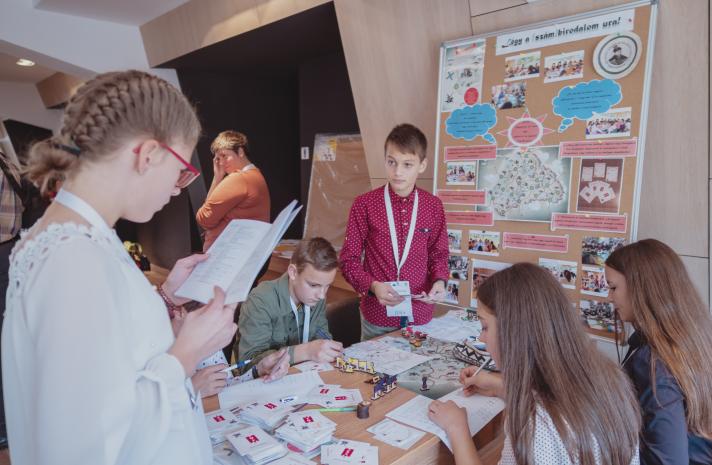Topic(s) addressed
-
Focus on students’ autonomy, empowering them, improving their critical thinking
-
Learning by doing, exploratory learning, multidisciplinary approaches, experimental learning
-
Rethinking the use of space
-
Supporting children with learning difficulties
Target groups
-
20 school teachers
-
over 500 learners
-
447 teachers and educational stakeholders
Methodologies
-
Being “everyday creative” as a new objective set for teachers and students
-
Digital self-reflection, reading and getting inspired by positive examples, co-creating learning results and peer feedback as tools to improve schools, communities and teaching practices
-
Changing classroom settings, redefining the school’s role
-
Varied teaching methods to inspire creativity and new ways of cooperation inside and outside schools
-
Creating the Teachers’ Handbook
The main development areas:
-
Learning space and multi-sensory teaching
-
Applicable skills through teaching
-
Interaction and technology in the school
-
Linking different subjects in learning and teaching
Environments
Developing learner-centred indoor and outdoor environments as a training module for teachers.
Re-designing the classrooms after the on-site training in Finland:
-
creating more educational spaces in schools
-
revisiting the use of some school spaces
-
redesigning to make the learning environment more welcoming and user-friendly
-
designing a “family school holiday” and learning laboratories
Teachers
-
Teachers as the main focus of the project– the results co-created by practising teachers from all participating countries:
-
They were involved in designing all learning tools (self-assessment tool, training course, follow-up projects, multiplication workshops).
-
They were frequently asked to (self-)reflect, elaborate on current practice and future professional aspirations and find and share best practices.
-
Their commitment was celebrated at “creativity fairs”.
-
Teachers have gone through a complex professional development process as shown in the Teachers’ Handbook.
Impact
The local development projects presented in the follow-up reports (see the Teachers’ Handbook).
The 20 impact activities/projects, reported from 4 countries and over 30 classes, can be put into one of these categories:
-
Pedagogical thinking (student autonomy, role of student)
-
Pedagogical change (student-centred pedagogy)
-
Learning space and environments, educational spaces;
-
Pedagogical tools (apps, materials)
-
Pedagogical approach (collaboration, co-teaching, cooperation, interdisciplinarity, learning by doing)
- Reference
- 2017-1-RO01-KA201-037185
- Project locations
- Romania
- Project category
- Secondary education
- Project year
- 2022
Stakeholders
Coordinators
Fundatia Centrul Educational Spektrum
- Address
- Romania
Scoala Gimnaziala Jozsef Attila
- Address
- Romania
JYVASKYLAN YLIOPISTO
- Address
- Finland
STICHTING BUSINESS DEVELOPMENT FRIESLAND
- Address
- Netherlands
M-Around Tanacsado es Szolgaltato Korlatolt Felelossegu Társaság
- Address
- Hungary
BORGORETE SOCIETA COOPERATIVA SOCIALE
- Address
- Italy
Inthecity Project Development B.V.
- Address
- Netherlands

